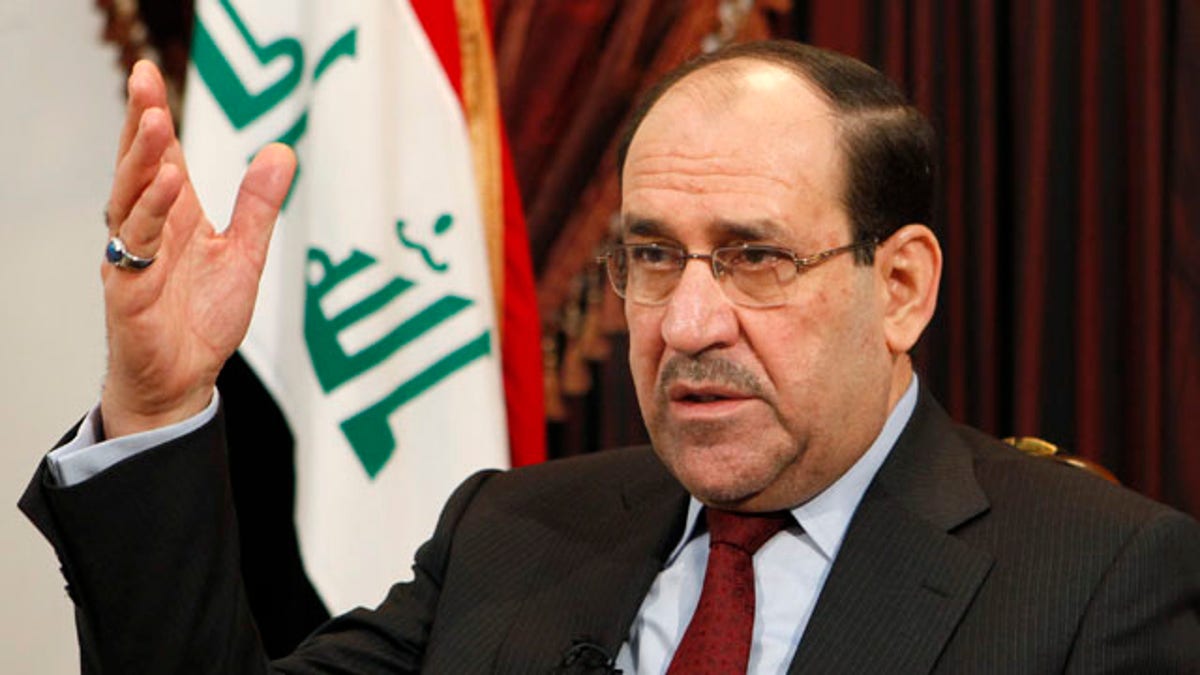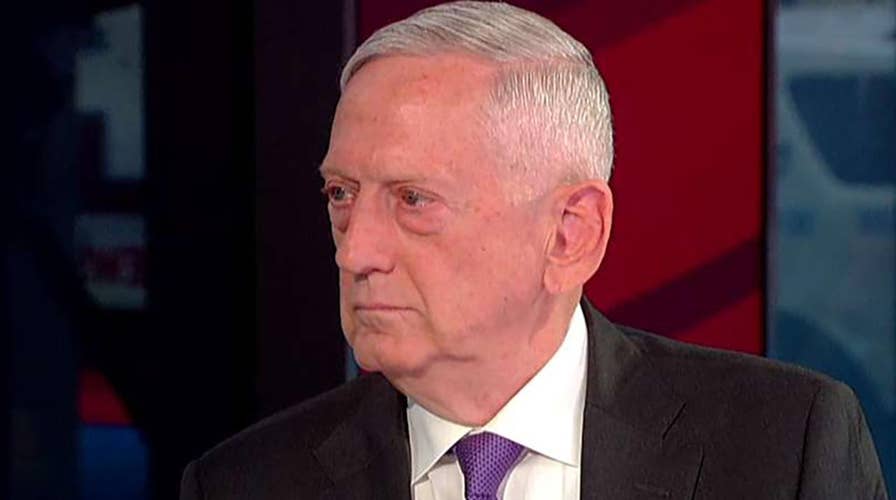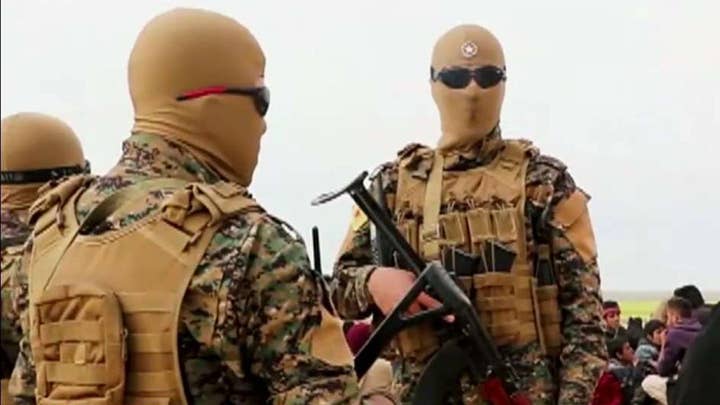James Mattis talks new book, relationship with Trump on 'Fox & Friends'
Former Defense Secretary James Mattis weighs in on the military response to Hurricane Dorian, his new book about learning to lead and his relationship with the president on 'Fox & Friends.'
Former Defense Secretary James Mattis, in stark terms, lambasts Barack Obama and Joe Biden for faulty leadership in his new book, and suggests their naivete and ignorance of reality contributed to the rise of ISIS in Iraq, according to excerpts reviewed by The Washington Examiner.
The book, "Call Sign Chaos: Learning to Lead," co-written with Bing West, does not delve into Mattis' discussions with President Trump. Mattis, speaking to "Fox & Friends" on Tuesday, said only that he did not have a "tense" relationship with the president.
"I try not to talk, having parted ways with the administration over matters of policy," Mattis said. "I don't want to talk from the cheap seats now and make their job more difficult." Mattis resigned from the Trump administration last December after clashing with the president over the abrupt withdrawal of U.S. troops from Syria and after two years of deep disagreements over America's role in the world.
But Mattis, in his book, did open up about his tenure as head of U.S. Central Command from 2010 to 2013, and zeroed in on the Obama administration's desire to wind down the U.S. troop presence in Iraq, no matter the cost.
Mattis wrote that Obama's tenure "was to be a time when I would witness duty and deceit, courage and cowardice, and, ultimately, strategic frustration."
ISIS USING BOOBY-TRAPPED BOVINES, DONKEY-BORNE EXPLOSIVES TO TARGET ENEMIES IN IRAQ
“In Washington, the debate swirled throughout 2011 about how many, if any, U.S. troops should remain in Iraq,” Mattis recounted. “Central Command, the chairman of the Joint Chiefs and the new defense secretary, Leon Panetta, who had replaced Bob Gates, continued to recommend to the White House retaining a residual force, as did Secretary of State Hillary Clinton."
All of them, Mattis asserted, were "talking to the wind," as Obama was singularly focused on living up to his public promises to end the war in Iraq. In late 2011, Obama said confidently in a speech to the nation that some 40,000 servicemen and women still in Iraq "will definitely be home for the holidays."
The administration's faith in Iraqi Prime Minister Nouri al-Maliki, Mattis said, was also misplaced.
“Prime Minister Maliki is highly untrustworthy, Mr. Vice President,” Mattis said he warned Biden. “He’s devious when he talks to us. ... He looks at our ambassadors and military advisers as impediments to his anti-Sunni agenda. He wants to purge or marginalize Sunnis and Kurds from the government."
"He exuded the confidence of a man whose mind was made up."
Mattis wrote that “Vice President Biden and his assistants listened politely. But as we spoke, I sensed I was making no headway in convincing the administration officials not to support Maliki. It was like talking to people who lived in wooden houses but saw no need for a fire department. ... I found him an admirable and amiable man. But he was past the point where he was willing to entertain a ‘good idea.’ He didn’t want to hear more; he wanted our forces out of Iraq. Whatever path led there fastest, he favored.
WATCH: MATTIS SAYS HE DIDN'T HAVE 'TENSE' RELATIONSHIP WITH TRUMP
"He exuded the confidence of a man whose mind was made up, perhaps even indifferent to considering the consequences were he judging the situation incorrectly," Mattis concluded.
According to Mattis, Biden countered that “Maliki wants us to stick around, because he does not see a future in Iraq otherwise. I’ll bet you my vice presidency.”

Dec. 3, 2011: Iraq's Prime Minister Nouri al-Maliki speaks during an interview with The Associated Press in Baghdad, Iraq.
Afterward, Mattis said, "Iraq slipped back into escalating violence. It was like watching a car wreck in slow motion. ... All of this was predicted — and preventable.”
In 2016, faced with the rise of the Islamic State (ISIS) in the Iraq power vacuum that he had once dismissed as a "junior varsity" effort, Obama sent 5,000 troops back to Iraq. ISIS' major strongholds fell under the Trump administration, although experts warn that the group remains dangerous.
Nevertheless, Biden -- who was nominally in charge of overseeing troop withdrawals from Iraq under the Obama administration -- has touted his efforts in that capacity as he runs for president. “I made sure the president turned to me and said, ‘Joe, get our combat troops out of Iraq,'" Biden said in Miami in June. "I was responsible for getting 150,000 combat troops out of Iraq, and my son was one of them.”
In July, Biden claimed, “When I was vice president, the president gave me all the easy jobs, like ‘take care of getting all our troops out of Iraq,’ which we did.”
TRUMP SLAMS OBAMA FOR NOT ENFORCING 'RED LINE' AFTER 'ANIMAL' ASSAD APPARENTLY USES CHEMICAL WEAPONS
The Washington Post's fact-checker has noted that Biden has preferred not to mention on the campaign trail the troops' eventual return to Iraq under his watch.
In his book, Mattis also faulted Obama's failure to enforce his own self-imposed "red line" upon the use of chemical weapons in Syria had weakend the U.S. globally.
“Old friends in NATO and in the Pacific registered dismay and incredulity that America’s reputation had been seriously weakened as a credible security partner,” Mattis wrote. “Within 36 hours, I received a phone call from a friendly Pacific-nation diplomat. ‘Well, Jim,’ he said, ‘I guess we’re on our own with China.'”
He continued: “Over the next several years, Syria totally disintegrated into hell on earth. The consequences included an accelerated refugee flow that changed the political culture of Europe, punctuated by repeated terrorist attacks. And America today lives with the consequences of emboldened adversaries and shaken allies.”
Mattis separately recounted his own ignominious firing by Obama, after months of disagreement over military policy.
“In December 2012, I received an unauthorized phone call telling me that in an hour, the Pentagon would be announcing my relief,” Mattis said. "I was leaving a region aflame and in disarray. The lack of an integrated regional strategy had left us adrift, and our friends confused. We were offering no leadership or direction. I left my post deeply disturbed that we had shaken our friends’ confidence and created vacuums that our adversaries would exploit.”
Speaking to "Fox & Friends," Mattis emphasized that his book was not entirely about disagreements over geopolitics and strategy.
"It's about leadership," Mattis said. "It's about allies, it's about how do you set the vision as a leader so that all your young people, right down to the youngest 18-year-olds, feel a sense of ownership?"














































